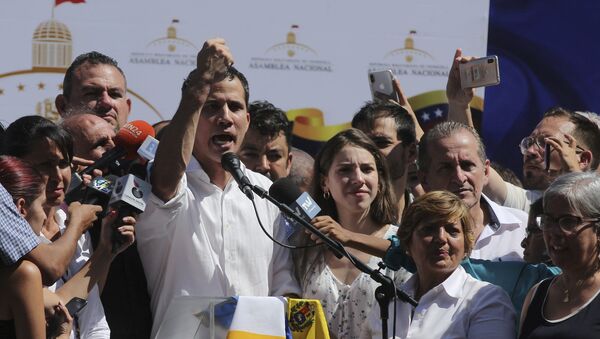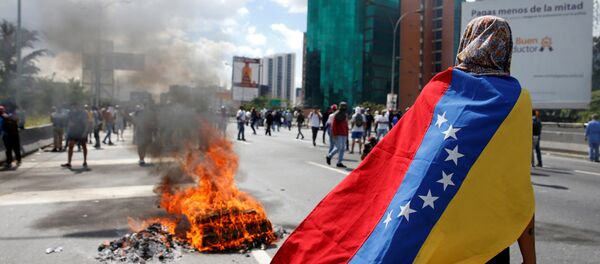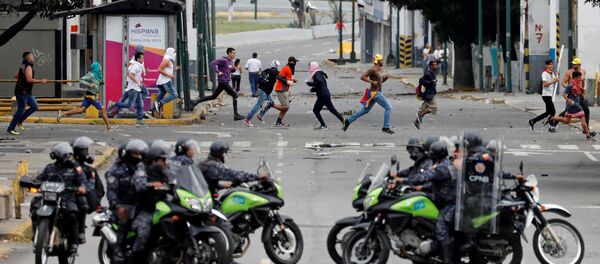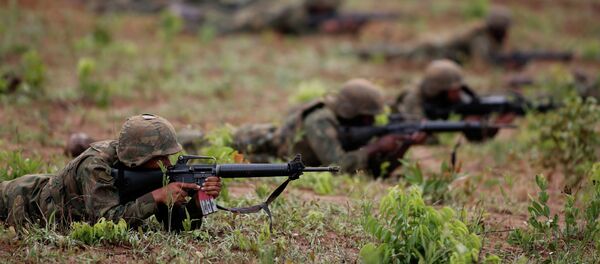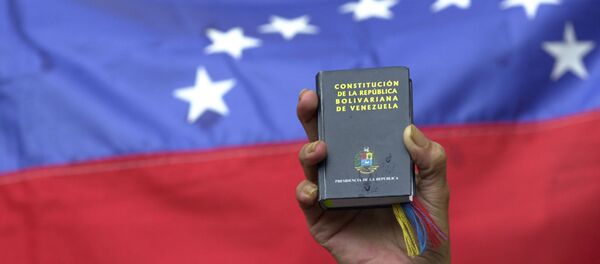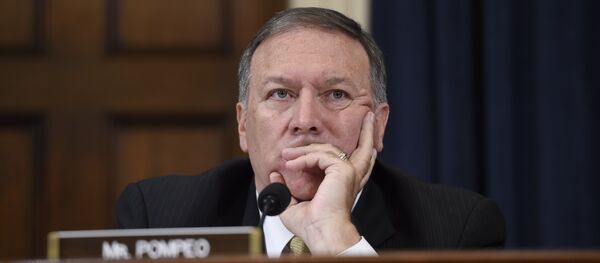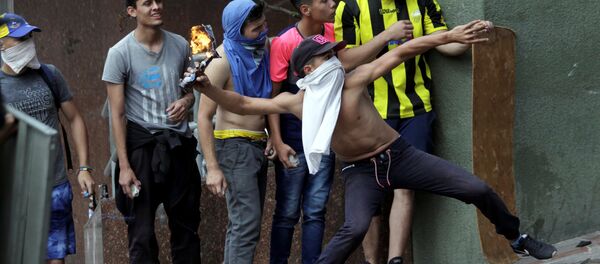Tear gas, firearms and armoured vehicles are being used; cars and whole houses are burning, and many streets are littered with barricades of garbage and old tires. However, the clashes continue almost without respite — every couple of hours there are reports about shootouts in different areas.
The country is now divided between two presidents: Nicolas Maduro, who started his second term on January 10, and Juan Guaido, who declared himself the country's interim president on Wednesday. So far, no one can predict how long this rebellious mood in the country will last, but when the people of Venezuela did not agree with Maduro’s refusal to recognize the powers of the elected parliament back in 2017, clashes continued for several months.
Cooking Pot Revolution
January 23 had been announced earlier by both Guaido and by Maduro as the day protests would begin. Perhaps that is why the military coup attempt in Caracas two days prior whipped up and aggravated the Venezuelans' rebellious sentiment.
#Update: Riot police shooting with rubber bullets on protestors in #Anzoategui in Venezuela. pic.twitter.com/lFBbzpSdMg
— Sotiri Dimpinoudis (@sotiridi) 23 января 2019 г.
READ MORE: Will Trump's Coup Attempt in Venezuela Succeed?
The insurrection of the National Guard officers was put down within hours, but clashes between security officials and ordinary citizens began immediately afterwards.
Initially, judging by social media reposts, people expressed their discontent by clanging their pots and pans and only then started to throw stones and build barricades.
Information about the protests came not only from the country's capital. A statue of former Venezuelan President Hugo Chavez was burned in the city of San Felix in Bolivar state, while a police station in the city of Puerto Cabello in Carabobo state was burned down. The first reports about deaths appeared in the early hours of Wednesday — the first said that a 16-year-old teenager had died, then reports emerged of a woman being killed.
Day X
The protests did not subside until Wednesday morning when pro- and anti-government rallies were to officially begin. By the morning, it was reported two people had been killed in the unrest.
Reportan saqueos en calles de La Vega, Caracas. Qué dicen los vecinos? Cuál es la situación en el sector? #23Ene 6:30PM pic.twitter.com/97j9jJZr7j
— Christian G.V 👨🏻💻 (@ChrisPrensa) 23 января 2019 г.
That morning, social media's attention turned toward to Caracas as the epicentre of protests. Venezuelan entertainers both in and outside the country called on the people for change, while the nation's bishops and the head of the opposition parliament asked the military and security officials to take the people's side and protect them.
READ MORE: Hola! US Backs a Coup in Venezuela, Then Uses Spanglish to Encourage Protests
People were walking with flags and banners, chanting slogans. Puppets with the inscription "usurper" and depicting Maduro in a red shirt and cap — clothes and colours favoured by his predecessor Hugo Chavez — were hung on the city streets.
People literally flooded the central streets of Caracas and subway platforms.
"We left the house at five in the morning. We hope for much, we hope that all the bad moments that we had will end. We go out in groups, arrive in cars, there were also people who came by two buses", a protester named Adriana, whose words were quoted by El Nacional portal, said.
INCREÍBLES Imágenes de un pueblo que quiere cambio. Caracas / Venezuela #23Ene 3:00PM pic.twitter.com/6tgEAxOYoh
— Christian G.V 👨🏻💻 (@ChrisPrensa) 23 января 2019 г.
Maduro's supporters noted the role of the external factors in the protests.
"I am motivated by my love for the motherland, a desire to protect the motherland. There is no other country like Venezuela. [I am directed] by the plan of Hugo Chavez and the support of our Nicolas Maduro for the defence of peace and in the rejection of US interventionism", Omayra Oropesa, a presidential supporter, told Sputnik.
Social media users have said that the security forces were sending armoured vehicles to the area where Guaido's so-called inauguration took place and using tear gas in the subway in Caracas. A member of the opposition parliament reported shooting at residential buildings in the city of La Guaira. As many as 700 residents of the city of Maturin were hiding in a cathedral under siege by the National Guard for three hours. A police station was shelled and a police truck stolen.
La policia se une a manifestantes en Carabobo #23Enero pic.twitter.com/6EPydaZIWB
— Manuel Diaz (@manu_diaz17) 23 января 2019 г.
According to media reports, the death toll in the protests has gone up to 16 people. Human rights activists have said that 218 people have been detained during the three days of protests.
READ MORE: Trump Recognises Venezuela's Opp Leader Juan Guaido as Acting President (VIDEOS)
On Wednesday afternoon, social media users shared photos and videos of numerous processions, performances, applause and chants winding up the crowd. By the time evening came around, the streets were covered with tear gas vapours, burning cars, bloodied people, overturned garbage cans and destroyed barricades.
Whole Region at Risk
Juan Guiado's self-proclamation as interim head of state creates a conflict not only in Venezuela but throughout Latin America, first vice-chairman of the international affairs committee of the lower house of Argentine parliament Guillermo Carmona told Sputnik.
"I believe that the latest developments give rise to a conflict situation not only in Venezuela, but in the whole region", the lawmaker said.
#Update: Hundreds of farmers now backing and supporting the protests in #Venezuela Picture credit: @leoperiodista pic.twitter.com/0X0WwZb6f1
— Sotiri Dimpinoudis (@sotiridi) 23 января 2019 г.
He drew attention to the fact that the United States was again influencing the policies of the governments of Latin American countries.
"The fact that the Lima Group [established in August 2017 by 12 countries of North and South America to promote democratic reforms in Venezuela], which recognizes Guaido as the interim president of Venezuela, does it right after the statements of [US President] Donald Trump or [US Vice President] Mike Pence, demonstrates that we are experiencing regress. This leads us to the policy of the region being determined from Washington", Carmona said.
READ MORE: Skirmishes Across Venezuela as US, Allies Endorse Presumptive President Guaido
The politician said that the opposition’s recognition or non-recognition of the elections held in Venezuela in May 2018 had nothing to do with it belligerence towards the government, for which the Venezuelan people would ultimately pay.
In addition, the parliamentarian recalled that interest in Venezuela's rich oil reserves was behind this conflict.
"There are those who are ready to bring the sad experience of countries such as Iraq or Bolivia to Venezuela for the same reasons", Carmona concluded.
The Mexican Foreign Ministry in a statement on Wednesday said that Mexico would continue to recognize Maduro's government. According to the statement, Mexico would not follow suit and act against a country with which it has diplomatic relations based on the principles of non-interference, self-determination and peaceful resolution of international disagreements.
READ MORE: Venezuela Breaks Diplomatic Ties With United States, Orders Diplomats to Leave
Russian Foreign Ministry spokeswoman Maria Zakharova in a statement on Facebook said the current events in Venezuela showed the real attitude of the West toward international law and the sovereignty of other states.
The views and opinions expressed by the speaker do not necessarily reflect those of Sputnik.

